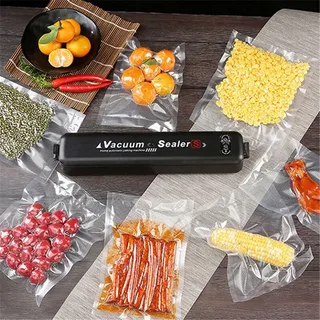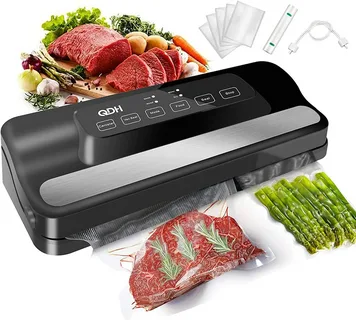Are you tired of throwing away spoiled food? Do you want to extend the freshness of your groceries and leftovers? Look no further than the Vacuum Sealer. These handy kitchen appliances are designed to remove air from packaging, creating an airtight seal that keeps food fresh for longer. This guide will explore the best vacuum sealer on the market and how they can revolutionize your food storage routine.
Understanding the Magic behind Vacuum Sealers
Vacuum sealers operate on a simple yet effective principle: they extract air from the bag or container holding food, then securely seal the bag, preventing air from re-entering. This air-removal process sets the stage for an extended shelf life for various food items. Air, particularly oxygen, is a key element that supports the growth of microbes, including bacteria and mold, which are the primary culprits behind food spoilage. By creating a vacuum, these sealers significantly reduce the oxygen level in contact with the food, slowing down microbial growth.
Furthermore, this technique minimizes the risk of freezer burn during long-term freezer storage. Freezer burn occurs when air comes into contact with frozen food, dehydrating the surface and affecting its texture and flavor. Vacuum-sealed foods are not exposed to air, thus retaining their quality over time. Not only does this process help in preserving the integrity of the food, but it also maintains its nutritional value, taste, and texture. This is especially beneficial for meats, vegetables, fruits, and even dry goods like coffee beans and spices, ensuring that the essence of your food remains intact until you’re ready to enjoy it. Vacuum sealers, therefore, offer a practical solution for extending the freshness and enjoyment of your favorite foods.
Factors to Consider before Purchasing a Food Vacuum Sealer
When shopping for Food Vacuum Sealer, it’s important to consider various aspects to ensure you choose the right model for your needs. Here are four critical factors:
· Type of Vacuum Sealer:
Vacuum sealers come in handheld, external, and chamber models. Handheld sealers are compact and portable, ideal for occasional use or smaller kitchens. External vacuum sealers suit most home users, balancing functionality and price. Chamber vacuum sealers, often used in commercial settings, can handle larger volumes and various food types, including liquids.
· Size and Storage:
Assess the available space in your kitchen. Some vacuum sealers can be bulky, so consider where to store the device when it’s not in use. Also, consider the size of the foods you plan to seal regularly to ensure the sealer accommodates your needs.
· Features and Settings:
Look for features that match your sealing needs, such as adjustable vacuum strength, seal-only functions, and controls for sealing delicate items without crushing them. Models with built-in cutters and storage for rolls of sealing bags add convenience.
· Cost and Consumables:
Beyond the initial purchase price, consider the ongoing cost of consumables like sealing bags or rolls. Some sealers require brand-specific bags, which can be more expensive, while others work with generic brands. Balancing upfront costs with long-term expenses will help you find a vacuum sealer that fits your budget and usage patterns.
Maximizing Your Vacuum Sealer’s Efficiency
To ensure your vacuum sealer operates at peak efficiency, it’s crucial to master the bag preparation and sealing technique. Begin by carefully arranging the items to be sealed, ensuring adequate space at the top of the bag—about three inches—to facilitate a strong, reliable seal. This space acts as a buffer, preventing any food from contacting the sealing area, which could compromise the vacuum’s integrity. For liquids and moist foods, consider pre-freezing or using a paper towel barrier within the bag to absorb excess moisture, ensuring a clean seal.
Regular maintenance is also a key factor in maximizing efficiency. After each use, inspect the sealer’s gaskets and sealing strip for wear and tear or any food residue that may have been left behind. A clean, intact sealing strip is essential for always achieving an optimal vacuum seal. Replacing these components as needed will keep your machine running smoothly.
Furthermore, periodically review your vacuum sealer’s settings and adjust them according to the type of food you’re preserving. Many models offer customizable settings for dry, moist, or delicate foods, enabling you to achieve the perfect seal and preserve the quality of your food more effectively. By adhering to these practices, you can significantly enhance the performance and efficiency of your vacuum sealer, ensuring that your foods remain fresh and flavorful for longer.
Creative Uses for Your Vacuum Sealer beyond Food Preservation
Vacuum sealers are not just for keeping your edibles fresh; they serve as versatile tools for a variety of non-food applications as well. They can be a game-changer for outdoor enthusiasts, as sealing camping supplies can protect them from moisture and make packing more efficient. Sensitive electronics, when vacuum-sealed, are safeguarded against humidity, dust, and other environmental factors that could cause damage. Important documents, such as birth certificates and legal papers, can be preserved from degradation due to air exposure, making vacuum sealers a valuable asset for organizing and protecting critical paperwork.
For those who enjoy crafting or collecting, vacuum sealers can help maintain the integrity of collectibles and craft materials, keeping them in pristine condition. Additionally, vacuum sealing can drastically speed up the marination process for meats, infusing flavors more deeply and quickly than traditional methods allow. This versatility extends the utility of vacuum sealers far beyond the kitchen, showcasing their potential as a multipurpose tool in your home.
Tips for Choosing the Right Bags for Your Vacuum Packing Machine
Selecting the appropriate bags for your vacuum sealer is paramount to maximizing the effectiveness of food preservation. Not all bags are created equal, and using bags that are specifically designed for your model enhances the seal’s quality and the duration of food storage. To ensure compatibility and optimal performance, always verify whether your vacuum packing machine requires proprietary bags or can accommodate universal vacuum seal bags. This distinction can affect long-term costs and the availability of supplies.
Opt for durable and puncture-resistant bags, as these qualities help maintain a vacuum seal under various storage conditions, including freezing and refrigeration. The thickness of the bag can be a critical factor—thicker bags often offer better protection against freezer burn and external odors, making them ideal for the long-term storage of meats and other perishables.
Additionally, consider the environmental and health aspects by choosing BPA-free bags, ensuring that no harmful chemicals can leach into your food. Some brands offer reusable bags, which reduce waste and provide a cost-effective solution for frequent users of vacuum sealers. Remember, the right bag not only extends the life of your food but also the efficiency and longevity of your vacuum sealer itself, making it an essential element of successful vacuum sealing.
Maintaining Your Vacuum Sealer for Longevity
Ø Regular Cleaning:
Keep your vacuum sealer in top condition by cleaning it after each use. Wipe down the exterior with a damp cloth and use a mild detergent if necessary. For the interior and the sealing strip, follow the manufacturer’s instructions for cleaning to prevent the buildup of food particles and residue that could affect performance.
Ø Inspect Seals and Gaskets:
Check the seals and gaskets regularly for signs of wear and tear. These components are crucial for creating an airtight seal and may need to be replaced periodically to ensure the machine continues functioning efficiently.
Ø Avoid Overworking the Machine:
To prolong the life of your vacuum sealer, be mindful not to overwork it during long sealing sessions. Allow the machine to rest and cool down after sealing several bags, especially if it gets unusually hot, to prevent overheating and potential damage.
Ø Store Properly:
When not used, store your vacuum sealer in a dry, cool place. Avoid exposing it to direct sunlight or extreme temperatures, which can damage the electronic components and the machine’s exterior. Proper storage also includes managing the cord correctly to avoid kinks and damage that could affect the power supply.
The Environmental Impact of Vacuum Sealing
Ø Reduction of Food Waste:
Vacuum sealing significantly extends the shelf life of foods, substantially reducing the amount of food thrown away. This contributes to less food waste ending up in landfills, where it produces methane, a potent greenhouse gas.
Ø Energy Savings:
By preserving food for longer periods, vacuum sealing can reduce the frequency of shopping trips and the associated energy costs of transportation. Additionally, it can decrease the energy required for refrigeration, as efficiently packed foods occupy less space and allow for more effective cooling.
Ø Plastic Use and Disposal:
While vacuum sealing relies on plastic bags, emphasizing reusable bags can mitigate the environmental impact. Selecting bags designed for multiple uses and proper disposal of single-use plastics are key considerations for minimizing the ecological footprint.
Ø Encourages Bulk Buying:
Vacuum sealers enable consumers to buy in bulk, reducing packaging waste from individual products and reducing the carbon footprint associated with more frequent purchases. Bulk buying and vacuum sealing promote a more sustainable consumption pattern.
FAQs
Q1: Can vacuum sealers work with any type of bag or do they require specific kinds?
A1: Most vacuum sealers are designed to work best with specific types of bags, often those manufactured or recommended by the same brand. However, some models are compatible with universal vacuum seal bags.
Q2: Are vacuum-sealed foods safe to store at room temperature?
A2: Vacuum sealing does prolong the freshness of foods by reducing air exposure, but it doesn’t eliminate the need for proper storage. Perishable foods, even when vacuum-sealed, should still be stored in the refrigerator or freezer.
Q3: How long can vacuum-sealed food last in the freezer?
A3: The shelf life of vacuum-sealed food in the freezer can extend significantly longer than non-sealed food. While the exact duration depends on the type of food, most vacuum-sealed meats can last up to 2-3 years in the freezer, and fruits and vegetables can last up to 2 years.
Conclusion
Embracing a high-quality vacuum sealer is a smart move towards enhancing your kitchen’s efficiency and sustainability. The right sealer can transform how you store food, significantly reduce waste, and ensure every meal is as fresh and flavorful as possible. With careful selection based on your needs, diligent maintenance, and a willingness to explore its various applications, a vacuum sealer becomes an invaluable tool. Beyond food preservation, its utility spans from protecting important documents to speeding up your marinating process. By incorporating this device into your daily routine, you contribute to a more sustainable lifestyle and enjoy the convenience and savings that come with extended food freshness. Embrace the change, optimize your food storage practices, and experience the myriad benefits of vacuum sealing.
| Other Good Articles to Read |
| Blogs Rain |
| Cme Blog Spot |
| Garcias Blogs |
| Yyc Blogs |
| Guiade Blogs |
| Blogs-Hunt |
| Impact-Blog |
| Smarty Blogs |
| Ed Blog |
| Mo Blogs |
| Blogs Em |
| Blogs T |
| Related Business Listings |
| Contact Directory |
| Local Business Profiles |



